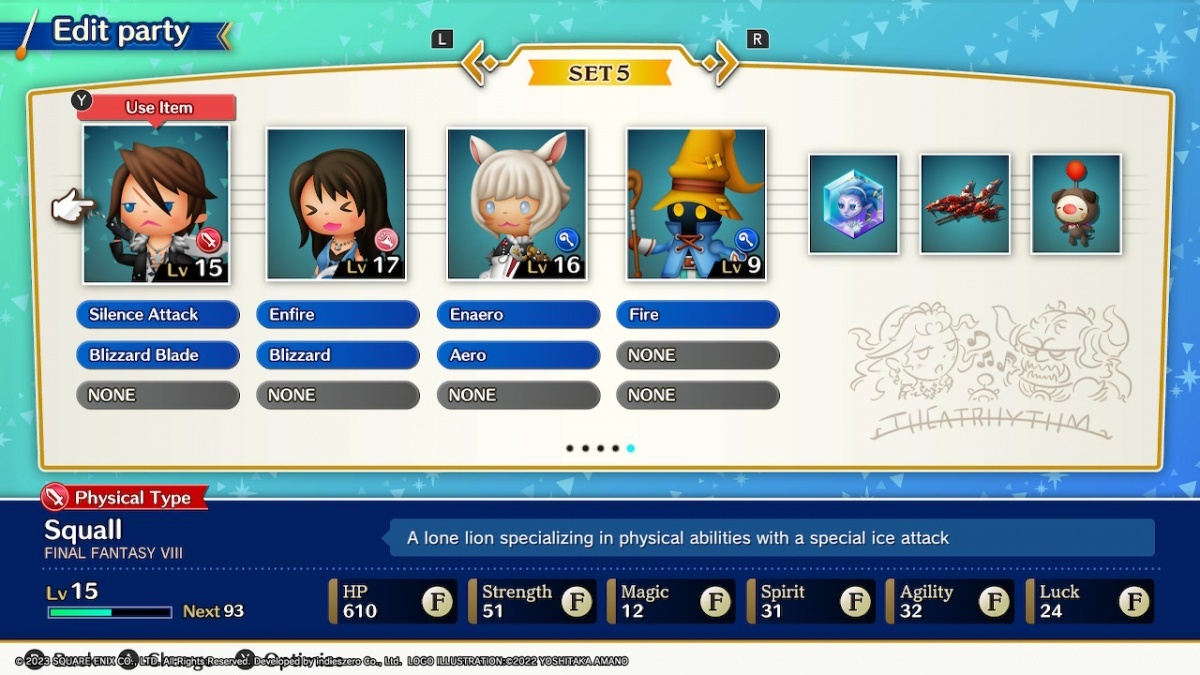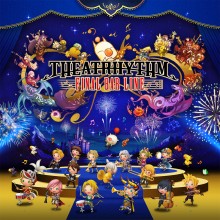Theatrhythm Final Bar Line (Nintendo Switch) Review
By Az Elias  25.02.2023
25.02.2023

Few franchises are worthy of creating an entire music rhythm game out of, but Final Fantasy is always going to be near the top of the pile. The renowned soundtracks, predominantly created by legendary composer Nobuo Uematsu in the past, are now played by orchestras around the globe, with Square Enix's official Distant Worlds concerts truly an experience to be recommended to any series fan. Tapping and swiping to the beats in the Theatrhythm entries on Nintendo 3DS was a great pleasure, and now the music game returns with Theatrhythm Final Bar Line.
This content-packed slice of rhythm heaven features tracks from up and down the Final Fantasy spectrum. Going much further than previous iterations, players will find tunes from not only the numbered mainline entries, but all manner of spin-offs, including Final Fantasy Tactics, Mystic Quest, Dissidia, Crystal Chronicles, The 4 Heroes of Light, and so many others. There are even remixes from official arrangement albums featured. The boat has been pushed right out to cover a whole host of genres and fan favourites, almost reaching 400 songs in the base game alone.
Simple in its concept, there are generally two main types of song to play - battle scenes and field scenes. In both instances, different types of notes move from the left side of the screen to the right side, and when they line up with the section on the right, it's your job to hit the buttons or flick the sticks with the correct timing. Like most rhythm games, your score depends on how you perform and how accurate you are in your execution of note-tapping.

There are various difficulties for each song, and several customisation options to slow or speed up the notes that appear, so whether you're a casual player or rhythm expert, there is a way to tailor the experience pretty effectively. In fact, the entire game can be played with just a couple of buttons in the Simple control scheme, negating the need for stick flicking. Some of the tougher songs introduce pushing the sticks simultaneously in different directions, and that can often be the cause of bad performances. Removing them entirely is a welcome touch.
Should players have a buddy to jam with, tracks can also be blasted through in Pair mode - a way for another person to take part, with different lanes of notes assigned to each participant. For those that lack a local partner, though, there is the online mode that allows a maximum of four people to compete against each other - only in battle scene music, though. Sadly, field tracks can't be selected in this segment, which is a great shame.
Online matches have the option of using Bursts, special moves that cause mayhem on other players' screens, such as blocking their view of the notes or causing any poorly timed hit to be a miss. Such is the frustration of Bursts, though, that you may find not many choose to set their lobbies up with them, which, again, is a necessary option considering Curtain Call on 3DS forced their use.

What's great about taking part in online battles, though, is the ability to exchange summonstones that are set to your profile card. These stones feature special abilities that might help in all manner of ways, such as increasing the odds of finding items or collectable cards in a song, or upping the experience gained or damage dealt. And this is where the optional role-playing mechanic comes into play.
See, Theatrhythm isn't just about playing rhythm games. In true Final Fantasy fashion, up to four characters from a multitude of series titles can be chosen to take part in the background battles that play out beneath the core rhythm sequence of any given song. These cutesy-styled heroes (and villains) can be levelled up, earning abilities to equip that can help defeat enemies and bosses, thus rewarding in items, cards, and more. Poorly timed or missed notes reduce the party's HP, and a song can be failed if performance is bad enough that it reaches zero.
Every track in the Series Medley mode has its own quest that can be completed, whether it be earning 80% critical note hits or simply finishing a song with a specific character, adding a whole other incentive to replaying tracks and indeed levelling up characters, since some will do a better job at not only defeating foes, but even picking up extra chests for items and cards. With job types assigned to each character (e.g. physical and magic damage dealers, defenders that can take more hits, healers that restore HP, summoners that call forth the famous eidolons) there is a modicum of strategy required if looking to fully complete what is on offer.

The great thing about all this is that the RPG side of things can be pretty much ignored if desired. Playing around with characters and abilities, completing quests to earn collectable cards and artwork can be very fun, but it is entirely optional. If the focus is just to ace songs on varying difficulties, then that's totally acceptable.
Series Medley is where most will likely end up beginning their Theatrhythm journey, though. This semi-adventure mode sees you choosing your favourite title and playing through a bunch of songs from that game in sequential order, right up until the final boss music or ending theme. It's a great way to relive those fond Final Fantasy memories, and a handful of tunes only need to be completed before being rewarded a key to unlock another game of your choosing. This is the primary way to open songs that can then be replayed over in the separate Music Stage mode - although random songs can be played through and subsequently unlocked in this mode, too, if that's your thing.
An argument could be made for a slightly deeper adventure mode with a story element being included, sort of akin to the PSP Dissidia games and with a more involved world map, but Final Bar Line shouldn't be begrudged too much since what it sets out to achieve it does so perfectly well - that of delivering a massive range of terrific Final Fantasy songs to mash and flick fingers and thumbs to, with a secondary RPG-lite experience in the background.

Lack of touch controls is a downer, and may take some getting used to for those fresh off the 3DS games, but what a joy this game is once you nail a preferred button setup. Unlockable artwork from past games in the series is a neat addition to what can be rewarded, but the images are so small that the inability to zoom in on these feels like a surprising oversight.
Of course, Square Enix has made sure a truckload of DLC is on its way, with vocal songs, in particular, unfortunately being a separate pack that can be purchased. It's a frustration to see so much held back, including removing tracks like Final Fantasy X's "Zanarkand" from the base game to be put behind a paywall, but when there is such a massive selection and huge bump up from the amount available in the last game, it's hard to complain too much.
Still, there are questionable omissions, such as Final Fantasy VIII's "The Landing", certain lesser-known games are lacking any new tracks at all, and others are crying out for more than the handful they did get, compared to Final Fantasy XIV, which has been skewed with an excess of songs. It would have been great to get more album arrangements, particularly of the NES-era tunes, which can grate a little on the ears, but again, a lot of it comes down to personal preference.

Cubed3 Rating
Great - Silver Award

If you consider yourself a Final Fantasy fan, there is every reason to invest in Theatrhythm Final Bar Line. Rammed to bursting with songs that have helped to make the series what it is, there are tracks for everybody in here, with plenty of accessibility options to tinker with to suit all levels of player, including a fun RPG-lite mechanic that can be explored for extra incentive to replay favourite tunes. The DLC is vast and off-putting, but there is so much in the base game to tackle that it can be safely ignored.

![]() 8/10
8/10
![]() 0
(0 Votes)
0
(0 Votes)
 Out now
Out now  Out now
Out now  Out now
Out now  Out now
Out now Comments
Comments are currently disabled

 Sign In
Sign In Game Details
Game Details Subscribe to this topic
Subscribe to this topic Features
Features







 Top
Top

